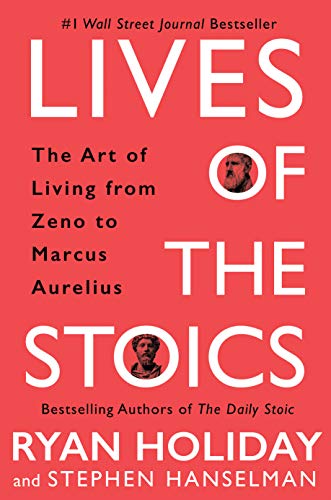
Lives of the Stoics: The Art of Living from Zeno to Marcus Aurelius

“Best,” to the Stoics, did not meaning winning battles. Superior did not mean accumulating the most honors. It meant, as it still does today, virtue. It meant excellence not in accomplishing external things—though that was always nice if fate allowed—but excellence in the areas that you controlled: Your thoughts. Your actions. Your choices.
Stephen Hanselman • Lives of the Stoics: The Art of Living from Zeno to Marcus Aurelius
To Cleanthes, we should be striving to become strong in those four virtues Zeno had talked about: Now this force and strength, when it is in things apparent and to be persisted in, is wisdom; when in things to be endured, it is fortitude; when about worthiness, it is justice; and when about choosing or refusing, it is temperance. In short: Courage.
... See moreStephen Hanselman • Lives of the Stoics: The Art of Living from Zeno to Marcus Aurelius
“Don’t explain your philosophy,” Epictetus said, “embody it.”
Stephen Hanselman • Lives of the Stoics: The Art of Living from Zeno to Marcus Aurelius
Bravery is the knowledge of what is terrible and what isn’t and what is neither.
Stephen Hanselman • Lives of the Stoics: The Art of Living from Zeno to Marcus Aurelius
“If a person gave away your body to some passerby, you’d be furious,” Epictetus said, yet we so easily hand our mind over to other people, letting them inside our heads or making us feel a certain way.
Stephen Hanselman • Lives of the Stoics: The Art of Living from Zeno to Marcus Aurelius
Just because someone has anxieties or self-doubts or was taught the wrong things early in life doesn’t mean they can’t become something great, provided they have the courage (and the mentors) to help them change.
Stephen Hanselman • Lives of the Stoics: The Art of Living from Zeno to Marcus Aurelius
Kierkegaard would later make the distinction between a genius and an apostle. The genius brings new light and work into the world. The genius is the prophet. The creator. The apostle comes next—a mere man (or woman) who communicates and spreads this message. Given Cleanthes’s dedication to Zeno, it seems likely that the two were never
... See moreStephen Hanselman • Lives of the Stoics: The Art of Living from Zeno to Marcus Aurelius
Humanity is given these instincts toward virtue by nature, and we can thrive and live nobly if we learn to live consistently with our own nature and our duties, while making the most of the resources we have been given.
Stephen Hanselman • Lives of the Stoics: The Art of Living from Zeno to Marcus Aurelius
“Remember,” he said, “that it’s not only the desire for wealth and position that debases and subjugates us, but also the desire for peace, leisure, travel, and learning. It doesn’t matter what the external thing is, the value we place on it subjugates us to another. . . . Where our heart is set, there our impediment lies.”